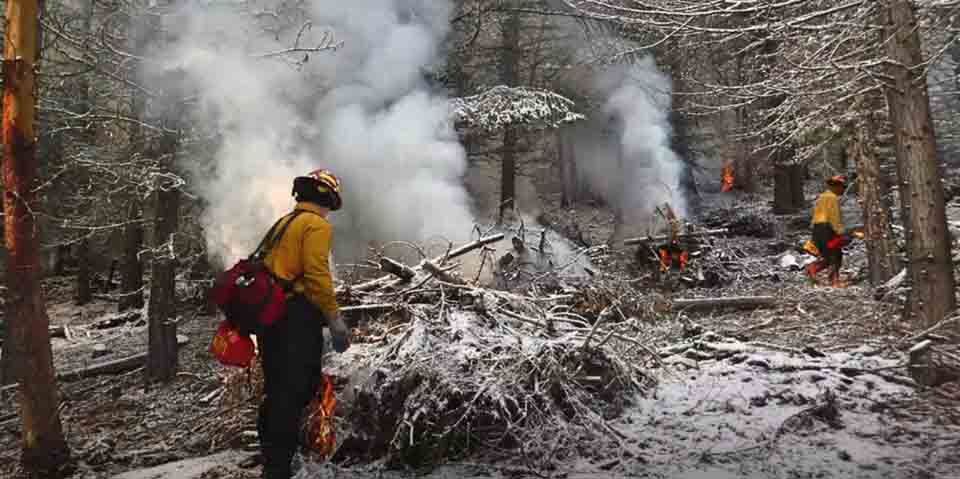Oregon Wildfire Survivors Will Not be Taxed but Wildfire Funding Solutions Fail

Only one of four proposals was unanimously approved in the Senate and House this week. Senate Bill 1520 ensures that survivors of wildfires do not pay tax on funding settlements and compensation for losses.
UPDATE: Oregon Governor Resets 2020 Wildfire Property Tax Rebuilds
The three bills that failed addressed wildfire prevention and response, wildfire protection fees and home hardening.
Oregon Department of Forestry in ‘Financially Precarious” Position
The failure of lawmakers to resolve wildfire funding issues has left the Oregon Department of Forestry (ODF) in a “financially precarious” position, says the chairman of the state’s Board of Forestry, Jim Kelly.
Read: Oregon Homeowners Face Tax Increases For Fire Protection
Kelly warns that the ODF will run out of money even if a normal wildfire season, starting in three to four months, is experienced. Describing the lack of decisive wildfire funding measures as “poor management,” Kelly says the ODF will have no option but to approach the Emergency Board for stop-gap funding.
The funding proposals
The session began with the opinion of Democratic lawmakers divided between whether all Oregon taxpayers, or only private property and business owners, should foot the lion share of the hundreds of millions of dollars needed for wildfire protection.
The need for new streams of wildfire funding follows last year’s 40% cutback on funding to state fire agencies. According to lawmakers, wildfire agencies have drawn heavily on the state’s general fund in recent years. In response, landowner wildfire protection fees have increased by up to 40%.
House Bill Came Under “heavy Scrutiny”
House Bil 4133, sponsored by Sen. Elizabeth Steiner, D-Portland and supported by Governor Tina Kotek, came under heavy scrutiny and was shelved before voting on Wednesday.
It is estimated that HB 4133 could have cost the ODF as much as $6 million, while industrial timberland owners would save money. An investigation by the Oregon Capital Chronicle found that the committee that crafted the proposal had a disproportionate number ofmembers on its panel who were employed by timber companies or were people working for an industry group.
Steiner confirmed that the Ways and Means sub-committee proposal had come under “heavy scrutiny” from lawmakers and the public. She says in an email that the bill was shelved before it came up for voting in the Joint Ways and Means sub-committee that she co-chairs because there was insufficient time to resolve “last minute fiscal issues.”
Rep. Paul Holvey, D-Eugene, told his peers in an email that he would not support the bill. He expressed concern that while saving industrial timber landowners money, the bill would come at a cost to Oregon taxpayers who have faced increasing taxation over the years to cover wildfire protection and prevention costs via the general fund.
Gov. Kotek set a proviso in her support of the bill by calling on the Legislature to resolve a long-term funding plan before the 2025 wildfire season.
In an email statement, the governor acknowledged that consensus failed and that the concerns about the bill “are legitimate issues for discussion as we work to create a comprehensive, long-term fix.”
Takeaways
In a letter to Legislature President Rob Wagner and Speaker Dan Rayfield, Gov, Kotek says: “All involved understand that the current landowner payment system is not sustainable and overly complex. It is becoming increasingly clear that the current funding structure is on the verge of driving key contributors to withdraw from participating, thereby placing the entire system at risk of collapse.” She supports House Bill 4133 “as an important step in our collective efforts to move toward a more comprehensive, equitable, and sustainable solution for managing future wildfires in Oregon.”
Of the 16 million acres (about twice the area of Massachusetts) the ODF protects from wildfires, 33% is owned by private industry, while less than 25% is public land, according to Joy Krawczyk, the department’s public information officer.
According to experts, the lack of additional and sustained funding translates to the state facing more costly and bigger wildfires, a cause for concern as the 2024 wildfire season will begin in three to four months.
References
https://www.documentcloud.org/documents/24455820-022924_hb-4133a-governors-letter
